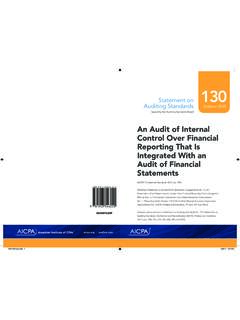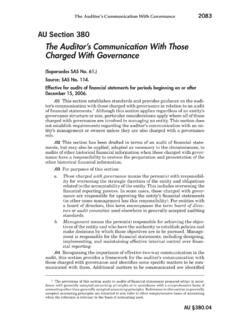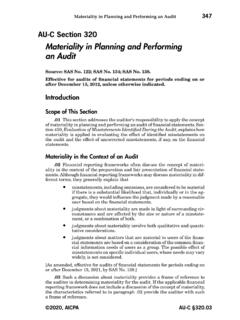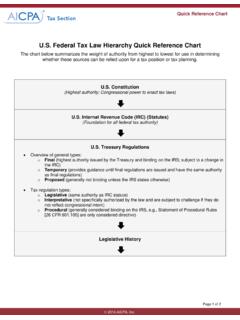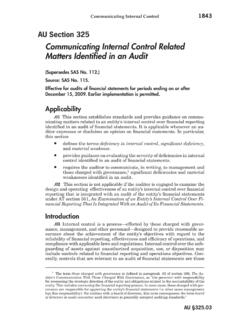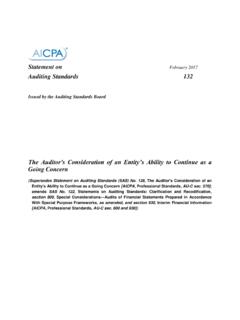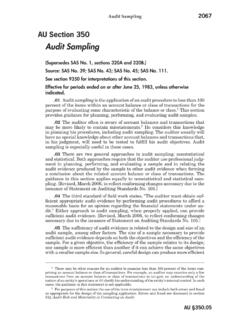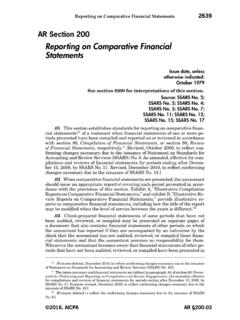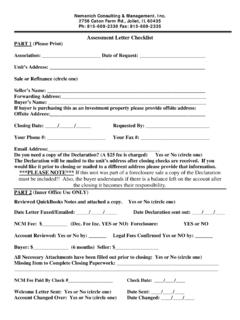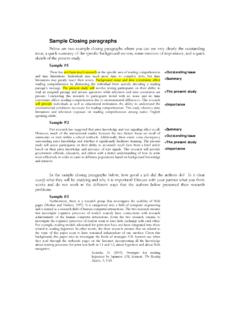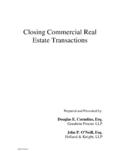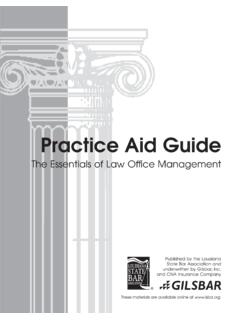Transcription of January 11, 2016 Acting Director, Specialty Exam Policy SB ...
1 January 11, 2016 Mr. Alfredo Valdespino Acting Director, Specialty Exam Policy SB/SE Examination Internal Revenue Service 5000 Ellin Road, C9-400 Lanham, MD 20706 Re: Comments on Updated IRS Frequently Asked Questions on Estate Taxes (Updated June 16, 2015, November 2, 2015, and December 4, 2015)1 and New Policy on Issuing closing Letters Only Upon a Separate Request Dear Mr. Valdespino: The American Institute of CPAs (AICPA) submits the below comments in response to the recent update of the IRS Frequently Asked Questions (FAQs) on Estate Taxes and the new Internal Revenue Service (IRS) Policy of issuing IRS estate tax closing letters only upon a separate request four months after filing the estate tax return. The AICPA suggests the IRS: 1. Formally announce its Policy regarding issuing estate tax closing letters via issuing an official Procedure or Notice. 2.
2 Revise Form 706, Estate (and Generation-Skipping Transfer) Tax Return, to add a box to check to request a closing letter . Until the next revision of Form 706, the IRS should allow estates to request a closing letter by adding a hand-written request on the top of the first page of Form 706 or by attaching a page requesting the closing letter to Form 706 when it is filed. 3. Consider procedures to issue closing letters (not just transcripts with codes) through the transcript delivery service (TDS). The AICPA is the world s largest member association representing the accounting profession, with more than 412,000 members in 144 countries and a history of serving the public interest since 1877. Our members advise clients on federal, state and international tax matters and prepare income and other tax returns for millions of Americans. Our members provide services to individuals, not-for-profit organizations, small and medium-sized business, as well as America s largest businesses.
3 1 See IRS website url: Mr. Alfredo Valdespino January 11, 2016 Page 2 of 8 Background Estate Tax Return Filing Requirement Form 706 is required to be filed by an executor or personal representative (collectively hereinafter executor ) of a decedent s estate if the value of the gross estate plus adjusted taxable gifts and the specific exemption exceeds the applicable exclusion amount in place in the year of the decedent s death ($5,450,000 for 2016 ). For estates under this threshold amount, Form 706 is required to be filed for the executor to elect to transfer the deceased spousal unused exemption ( DSUE ) amount to the decedent s surviving spouse (commonly referred to as the portability election ). The return is due nine months after the date of death of a decedent; a six-month extension of time to file the return is available upon application.
4 Prior IRS Process for closing Letters Until the IRS issued updated FAQs on Estate Taxes on June 16, 2015, the executor expected to receive an IRS Estate Tax closing Document (IRS letter 627) (referred to as a closing letter ) (see end of these comments for a redacted example). The closing letter provides the executor evidence that the IRS has accepted Form 706 as filed or after an adjustment to which the executor had agreed. In the past, the closing letter was automatically sent to every estate that filed a Form 706 and generally was received within four to six months after the filing of the return or completion of an estate tax audit, whichever occurred later. New IRS Process for closing Letters The IRS estate taxes FAQs website page update on June 16, 2015, disclosed a change in the long-standing IRS practice of automatically issuing a closing letter to the executor of every decedent s estate for which a Form 706 is filed.
5 Pursuant to the newly-issued IRS FAQs, for all Forms 706 filed on or after June 1, 2015, closing letters will be issued only upon request by the executor. Further, the FAQs state that executors will need to wait at least four months after filing Form 706 to separately request a closing letter . We note that on July 2, 2015, the IRS also posted a short blurb on another IRS webpage about a change in its Policy on closing letters, directing taxpayers to the FAQs website for more information. As of November 2, 2015, the FAQs website directed executors and practitioners to make their closing letter requests by a phone call to (866) 699-4083 and providing the name of the decedent, the decedent s social security number, and the date of death. Then, most recently, on December 4, 2015, the IRS updated the FAQs website to note that as an alternative to requesting a closing letter , an authorized representative of a taxpayer or registered tax professional may obtain an account transcript that will now reflect transactions including the acceptance of Form 706 and the completion of an examination.
6 Mr. Alfredo Valdespino January 11, 2016 Page 3 of 8 Further, on December 9, 2015, the IRS posted a webpage regarding transcripts in lieu of estate tax closing letters. It states: NOTE: The decision to audit a Form 706 is typically made four to six months after the filing date. Please wait four to six months after filing Form 706 before submitting a request for an account transcript. As a result, executors may need to wait 6 months (not just the 4 months on the FAQs website) from filing the Form 706 before starting the process for requesting an account transcript or closing letter . In addition, the recently posted instructions to Form 706 includes reference to the new Policy that closing letters must be requested at least 4 months after filing Form 706, and provides the (866) 699-4083 phone number for questions about requests and references the FAQs We assume that the IRS changed its Policy on automatically issuing closing letters on all Forms 706 because it anticipates an increase in the number of returns filed because estates under the monetary threshold are required to file a Form 706 to make the portability election.
7 Comments A. closing Letters Serve Many Useful Purposes and are Often Required We believe that the new Policy will not change the need for closing letters. closing letters serve many important purposes, including the following: 1. To assure executors that distributions can be made; 2. To notify states that impose an estate tax that the Form 706 has been accepted by the IRS; 3. To release federal or state tax liens on property owned by a decedent; 4. To satisfy requirements of financial institutions that require this type of assurance before releasing funds or transferring clear title to property; and 5. To provide certainty to the beneficiaries that the estate value is 2 The updated instructions to Form 706 state: closing letter procedure. Effective for all estate tax returns filed on or after June 1, 2015, closing letters will not be issued unless requested by the executor of the estate or the designated power of attorney.
8 To allow time for processing, please wait at least four months after filing Form 706 to request a closing letter . For questions about estate tax closing letter requests, call (866) 699-4083 or see the Frequently Asked Questions on Estate Tax at 3 We note that with the recent changes to Internal Revenue Code sections 6035 and 1014 in the Highway Bill, The Surface Transportation and Veterans Health Care Choice Improvement Act of 2015 (Transportation Act), 114-41) this summer, there is an increased importance in knowing when the IRS has made a final determination of estate value, and, therefore, basis to a beneficiary. A closing letter provides certainty to the beneficiaries that the estate value is binding. Mr. Alfredo Valdespino January 11, 2016 Page 4 of 8 Therefore, the IRS will still need to issue closing letters. The new transcript code will only help in the first above noted purpose. The procedure to obtain the transcript code seems complicated, and the new procedure is not likely to produce the result that is as user friendly as the closing letter .
9 1. Executors Often Require closing Letters to Meet Legal Responsibilities Before Making Distributions The executor of a decedent s estate is legally responsible for marshalling and maintaining the decedent s assets, settling debts and paying expenses (including income, gift, estate and generation-skipping transfer taxes), and distributing assets of the estate to the beneficiaries in accordance with the decedent s will or laws of intestacy. As a practical matter, a prudent executor will need confirmation that Form 706 has been accepted by the IRS before distributing assets to beneficiaries and will, therefore, wait until the closing letter is received before making a partial or final distribution. This practice is especially true if the estate is above the applicable exclusion amount because any adjustments to the return by the IRS could increase the amount of federal estate tax due.
10 We note that the transcript code indicating that Form 706 has been accepted as filed or an examination is complete would satisfy this executor need; however, this procedure would not help with the other above-noted purposes as hereinafter further explained. 2. Many States Require Estate Tax closing Letters Every state that levies an estate tax requires a copy of the closing letter from the IRS. Executors need the closing letter to file it with each relevant state tax authority where an estate or inheritance tax return was filed or in states where any estate taxes were paid. The state taxing authority can then issue its closing letter . 3. closing Letters are Needed to Release Federal or State Tax Liens on Property Owned by the Decedent closing letters are often needed in order to release a federal or state tax lien on real property that was owned by, and titled to, the decedent. A closing letter (along with a copy of Form 706 and proof of payment) is often needed to show the purchaser of the property that there is proof that no lien exists or that it has been satisfied.
